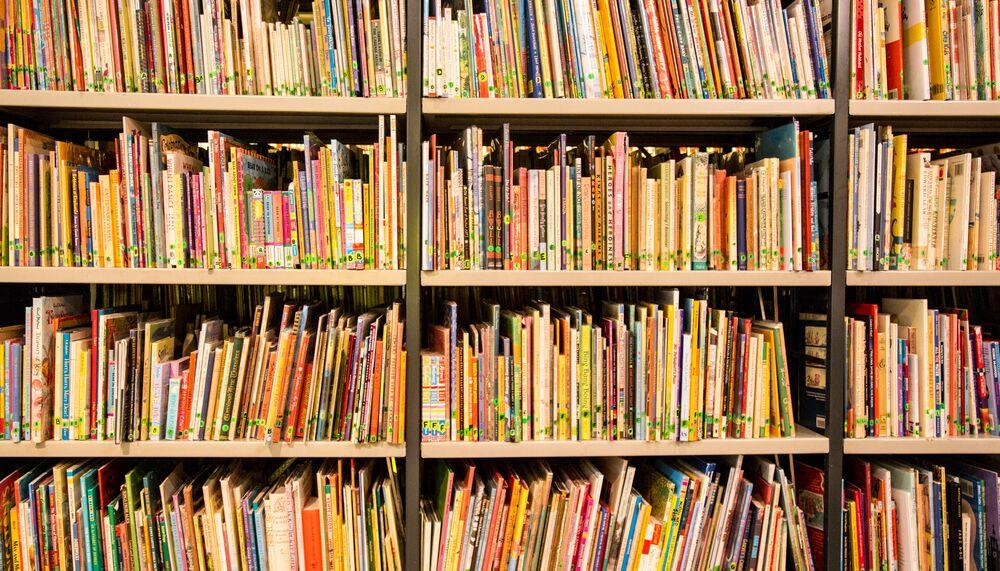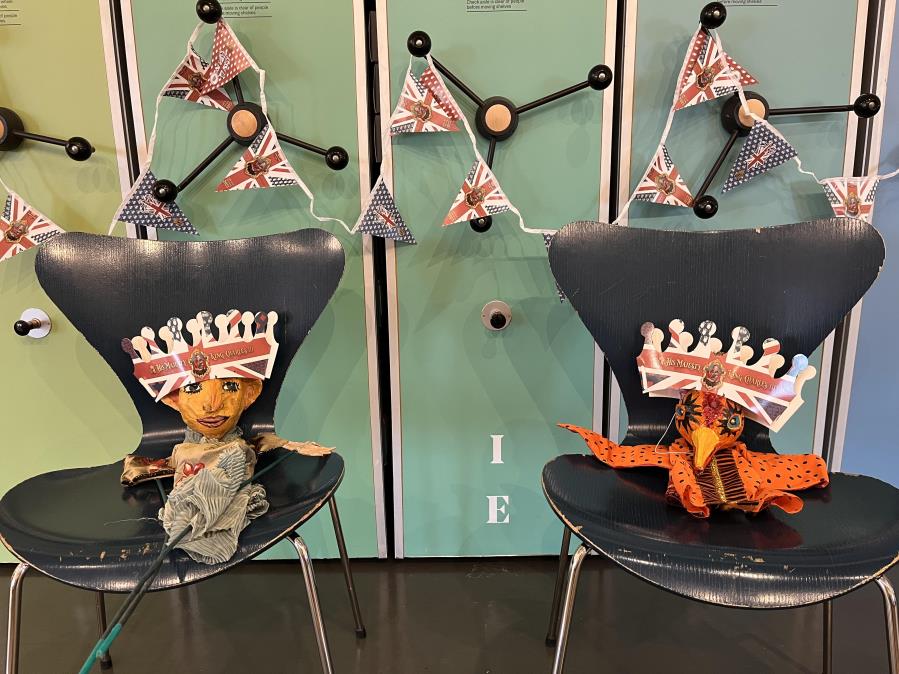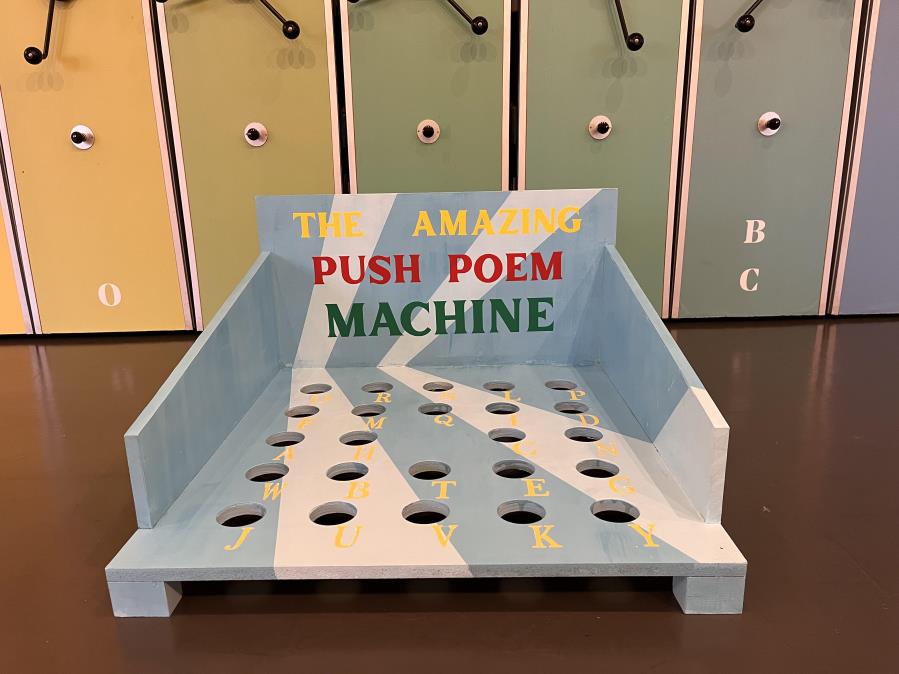The National Poetry Library: A Place for Children to Play with Poetry
Lorraine Mariner
This year the National Poetry Library (NPL) turns 70, but our children’s collection is really a child of the main collection. It was founded in 1988 when the children’s literature magazine Signal, which ran an annual poetry book prize, donated their collection to the library.
We now collect all new children’s poetry books published in the UK, with a selection from overseas (mainly the US), and a selection of rhyming story and picture books. We also have a separate young-adult collection that is looking very vibrant, thanks to the bright chunky spines and dramatic titles of the verse novels that have been published in recent years.

National Poetry Library’s Children’s Collection shelves.
The NPL was founded to make contemporary poetry more accessible to the British public and this remains our remit today. Although we’re based in London – on Level 5 of the Royal Festival Hall, Southbank Centre – anyone with a UK address can sign up to borrow four books for a four-week period (with up to three renewals if nobody else has reserved them). Children can become members too, with a parent or guardian signing up on their behalf, and we also have a special membership allowance for teachers who would like to borrow books for their classroom. In 2014 we launched an ebook collection so that members could sign up remotely and borrow poetry without having to visit the library in person, and we have a dedicated collection of ebooks and audiobooks available for children and young people https://poetrylibrary.overdrive.com/collection/1058675.
One of our ambitions at the NPL is to create lifelong poetry readers. The Royal Festival Hall is a popular place for new parents to meet with their babies so we started Rug Rhymes for under-5s and their carers, and we currently hold this twice a month on Fridays during termtime. Our Poetry Library puppets Federico and Firebird share traditional nursery rhymes, children’s songs and a rhyming picture book at themed sessions, along with some stellar children’s poetry. It’s been wonderful to see the publication of books of poems specifically for the very young, like Michael Rosen’s A Great Big Cuddle (2015), Jane Newberry’s Big Green Crocodile (2020) and Joseph Coelho’s Blow a Kiss, Catch a Kiss (2022) and we regularly use poems from these collections. These 30-minute sessions do have something of a party atmosphere (we had a special Coronation Rug Rhymes at the beginning of May) and our hope is that after the sessions families will borrow books and become regular visitors to the library.

National Poetry Library’s Federico and Firebird puppets. Coronation Rug Rhymes.
Following on from Rug Rhymes are workshops that schools can book for class visits, all based around workbooks the library has developed in collaboration with poets and artists. We have Poetry Explorers for primary schools, where children learn about using a library and also spend time reading and listening to poetry on CD. Over the years our audio collections have developed from vinyl, to cassette, to CD, back to vinyl – though we’re not aware of any new vinyl records of children’s poetry. We have Word Search, stylishly illustrated by typographic artist Oscar Wilson, that can be used with primary and younger secondary-school children, inviting students to collect up words across the Southbank Centre site to make their own poem. Letters Home, our most beautiful booklet, was created with the Henningham Family Press, and is also suitable for primary and secondary schools, and introduces students to experimental First World War poetry, highlighting how, paradoxically, the horror of machine war inspired poets to find new and playful ways of expressing themselves. For secondary schools we also have Poetry Box, a science and poetry activity developed with poet Mario Petrucci, where children use science and space exploration to create poems. And finally Dictionary Story, based on a visual poetry book by artist Sam Winston, that is well-suited for A-Level students studying art and design. We hope that all our workshops demonstrate the ways in which poetry can connect with other areas of the school curriculum.
And the library isn’t just for school visits. February half-term sees our annual Day of Children’s Poetry as part of the Southbank Centre’s Imagine Children’s Festival. The library is always closed on a Monday and so the Monday of Imagine sees the NPL transformed into a space for children and their grown-ups. We start the day with Rug Rhymes, then we have a workshop for ages 6–10. Over the years we’ve had workshops that combine poetry and illustration, brought to us by the Emma Press, and on another occasion poet and artist Ed Boxall. In 2020 Imagine had an environmental focus and Martin Kiszko, author of Green Poems for a Blue Planet (2011) and Verse for the Earth (2014) led a workshop and got the children writing in different forms; an animal kenning and a clerihew about an environmental issue. After lunch we transform the space into the set-up we use for our evening readings for adults – we replace the study desks in the main body of the library with chairs, add atmospheric uplighters and put a microphone on the stage in front of the rolling stacks. We then have two readings lasting about 45 minutes, one for ages 5–7 and one for ages 8–11. Over the years we’ve welcomed poets including Valerie Bloom, Carole Bromley, Liz Brownlee, Ieva Flamingo, John Lyons, Brian Moses, Karl Nova and Kate Wakeling, and for Imagine 2023 we were thrilled to have acclaimed and beloved children’s poet James Carter join us along with rising star Alex Wharton, who has since been named Children’s Laureate for Wales 2023–2025.
We have a regular programme of exhibitions in the NPL that we again hope can highlight the unexpected areas poetry can overlap with and bring new audiences to poetry who wouldn’t usually seek it out. Our current exhibition, Poets in Vogue, presents the fashion worlds and poetic work of seven women poets through a series of displays, including a skirt that belonged to Sylvia Plath. This exhibition has captured the imagination of secondary-school teachers and it’s been great to have visits from older teenage students. Prior to Poets in Vogue, our last exhibition was Poetry Games. Curated by Nick Murray and exploring the intersection between poetry and games, both board and video, it was a wonderful way to engage children and young people with poetry without them realising. Nick explained in an article for The London Magazine:
What the Poetry Games exhibition aims to do is address the common misperceptions of both poetry and games. That games are light, entertainment focused toys, and that poetry is the inaccessible and stuffy side of literature.
All the games in the exhibition could be played by visitors and we got very used to the click of buttons and joysticks. A legacy of this exhibition is that we’re now the proud owners of The Amazing Push Poem Machine, the latest iteration of a game that has been played since 1976 when it was named by Carol Ann Duffy. It brings all the fun of the fair to poetry writing with children. You take it in turns to throw a ball to randomly select a letter, which you then use as the first letter to write a word, the words becoming a poem. We’ve had great fun using it during school visits over the past year.

The National Poetry Library’s Amazing Push Poem Machine.
We’re open at weekends, 12 noon until 8pm on Saturdays and Sundays, and something that had become problematic now and again was balancing those wanting to quietly study and write poetry and the families who came to enjoy the books in our children’s collection. We started to develop a reading den space in the foyer outside of the library where children could freely make as much noise as they needed and run about. In 2017 the Nordic Matters Festival at the Southbank Centre meant that we worked with the Swedish Institute and Swedish Embassy in London to create a Room for Children, inspired by the Bibliotek Rum förBarn in Stockholm. Ikea provided the shelves and furnishings, and the Nordic embassies in London organised for Scandinavian children’s books in translation and in the original languages to be donated by publishers. Thanks to further support from the Swedish Institute and the Swedish Embassy this has now become the Little Library and we’ve added lots of poetry and picture books. We hope that being greeted by the Little Library as the glass lift reaches Level 5 immediately makes children feel welcome and that the NPL is a playful space for them.
Works cited
Coelho, Joseph (illus. Nicola Killen) (2022) Blow a Kiss, Catch a Kiss: Poems to Share with Little Ones. London: Andersen Press.
Kiszko, Martin (illus. Nick Park) (2010) Green Poems for a Blue Plane. Bristol: Redcliffe Press.
–– (illus. Nick Park) (2014) Verse for the Earth: More Green Poems for a Blue Planet!. Bristol: Wild Idea.
Mariner, Lorraine (2009) Furniture. Basingstoke,
Hampshire: Picador.
—— (2014) There Will Be No More Nonsense. Basingstoke,
Hampshire: Picador.
Newberry, Jane (illus. Carolina Rabei) (2020) Big Green Crocodile, Rhymes to Say and Play. Burley Gate, Herefordshire: Otter-Barry Books.
Rosen, Michael (illus. Chris Riddell) (2015) A Great Big Cuddle: Poems for the Very Young. London: Walker.
Website
The National Poetry Library: www.nationalpoetrylibrary.org.uk.
Lorraine Mariner is an Assistant Librarian at the National Poetry Library, having worked there for over 15 years. She has published two poetry collections for adults with Picador, Furniture (2009) and There Will Be No More Nonsense (2014).
